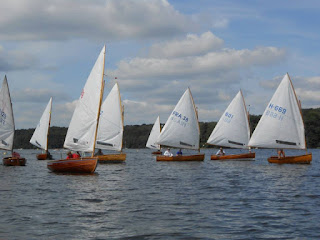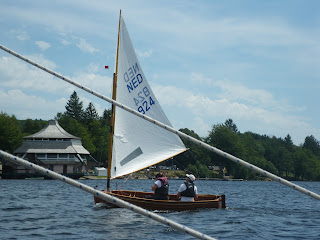Comme annoncé récemment, le weekend dernier a vu la plus belle flotte de Dinghy 12' bois jamais assemblée en France rivaliser d'élégance sur le Lac des Settons.
As previously advertised, last weekend saw the biggest fleet of wooden Dinghy 12' ever gathered in France compete with style on the Settons Lake.
16 bateaux au total répartis comme suit:
9 hollandais (dont 1 skipper canadien)
3 français (dont 1 n'a pas pu naviguer, avarie)
2 suisses (dont 1 skipper anglais)
1 australien (mais basé en Irlande, ce n'est pas trop loin des Settons)
1 allemand (normal, lui)
16 boats spread as follows:
9 Dutch (with 1 Canadian skipper)
3 French (one of whom could not sail due to a breakdown)
2 Swiss (with 1 English skipper)
1 Australian (but as he lives in Ireland, it's not too far from Les Settons)
1 German (this one normal)
Comité de course, arbitre, jury, sauveteur: Jack
Race committee, umpire, jury, lifeguard: Jack
 |
| Jack au centre / Jack in the middle |
Pour moi, tout a commencé le vendredi: quitter le bureau vers midi, prendre ma voiture chez moi, passer au club chercher le bateau, le remplir d'eau, passer des heures dans les bouchons, constater que toute l'eau a fui de la coque, penser à dégonfler les flottaisons vers 400 mètres d'altitude (Montesson est à 20m, les Settons frôle les 600m !), arriver au lac, gréer le bateau, le couler dans le lac pas trop profondément et enfin rejoindre les autres pour le barbecue avant qu'ils finissent les saucisses.
Everything started for me on Friday: leave the office around noon, take my car from home, pass by the Club to pick-up the boat, fill it up with water, spend hours in traffic-jams, realize the water all leaked out of the hull, remember to deflate the flotation reserves when already at 400m high (Montesson is around 20m high, les Settons is almost at 600m!), arrive to the Lake, rig the boat up, sink it in shallow water and then only join the other for the barbecue before they eat the last sausages.
Couler un peu Néarque
The shallow sinking of Néarque
 |
| Musique après le diner / Music after dinner |
Les participants rassemblés sous un barnum se retrouvent ou font connaissance. Soi-disant, il y aura plus de 15 nœuds de vent demain, on verra bien. C'est très calme ce soir en tout cas.
The contestants gathered under a big tent are rejoining or meeting for the first time. Some say that there will be more than 15 knots of wind tomorrow. We'll see. It's dead calm tonight anyway.
Le lendemain matin, en effet, le vent souffle fort. Quelques moutons sur le lac, je suis content d'avoir un lourd équipier, Laurent, avec moi à bord. Nous vidons mon dinghy avec mon admirable pompe électrique portative rechargeable et faisons nos premières courses.
The next morning, it's true the wind blows rather strongly. There are a few whitecaps and I'm happy to sail with my heavy crew, Laurent. We empty my dinghy with my excellent electric handheld battery operated water pump and we start our first legs.
Ces photos ne sont pas censurées, mais il y avait de l'eau sur mon objectif à cause de notre vitesse dans le clapot.
These pictures are not censored, there was water on my lens due to our speed in the chop
 |
| Deux voiles ? Two sails ? |

Le samedi nous n'avons navigué qu'à 14. Pierrot avait cassé 2 clins, Frédéric n'ose pas sortir à cause du vent.
On Saturday, only 14 of us sailed. Pierrot broke 2 boards, Frédéric did not dare going out with this wind.
3 manches le matin, 2 l'après midi.
3 legs in the morning, 2 in the afternoon
La pause déjeuner, prévue sur une plage lointaine finalement se fera sur la base Activital.
The lunch break, supposed to be on a beach far away was finally held on the Activital base.


 Nous alternons des manches courtes et des plus longues quand nous faisons le tour de l'ile.
We sail short and longer courses when we do the turn round the island
Nous alternons des manches courtes et des plus longues quand nous faisons le tour de l'ile.
We sail short and longer courses when we do the turn round the island
 |
| une manche courte et une longue ensemble / a short and a long leg together |
Tous les départs que lance Jack se font au lièvre. Ça n'est pas très courant en dinghy mais ça a l'avantage de nécessiter peu de monde à organiser et d’être rapide à lancer. Comme m'a dit Jack le dimanche: "tu vois, les départs au lièvre, il y a eu une fois où nous avons attendu 5 mn, le temps que le vent s'établisse, alors qu'en départ classique, il y aurait eu au moins 5 mn d'attente avant chaque départ".
All the starts lauched by Jack are gate starts. It's not very common in the Dinghy 12 class, but it has the advantage of needing few people to organize and to be quick to launch. As Jack told me on Sunday: " you see, with gate starts, only once did we wait 5 mn for the wind to settle on a direction, while if we had done classical starts, we would have waited at least 5 mn before each start".
 |
| Jack lançant un départ / Jack launching a race |








































